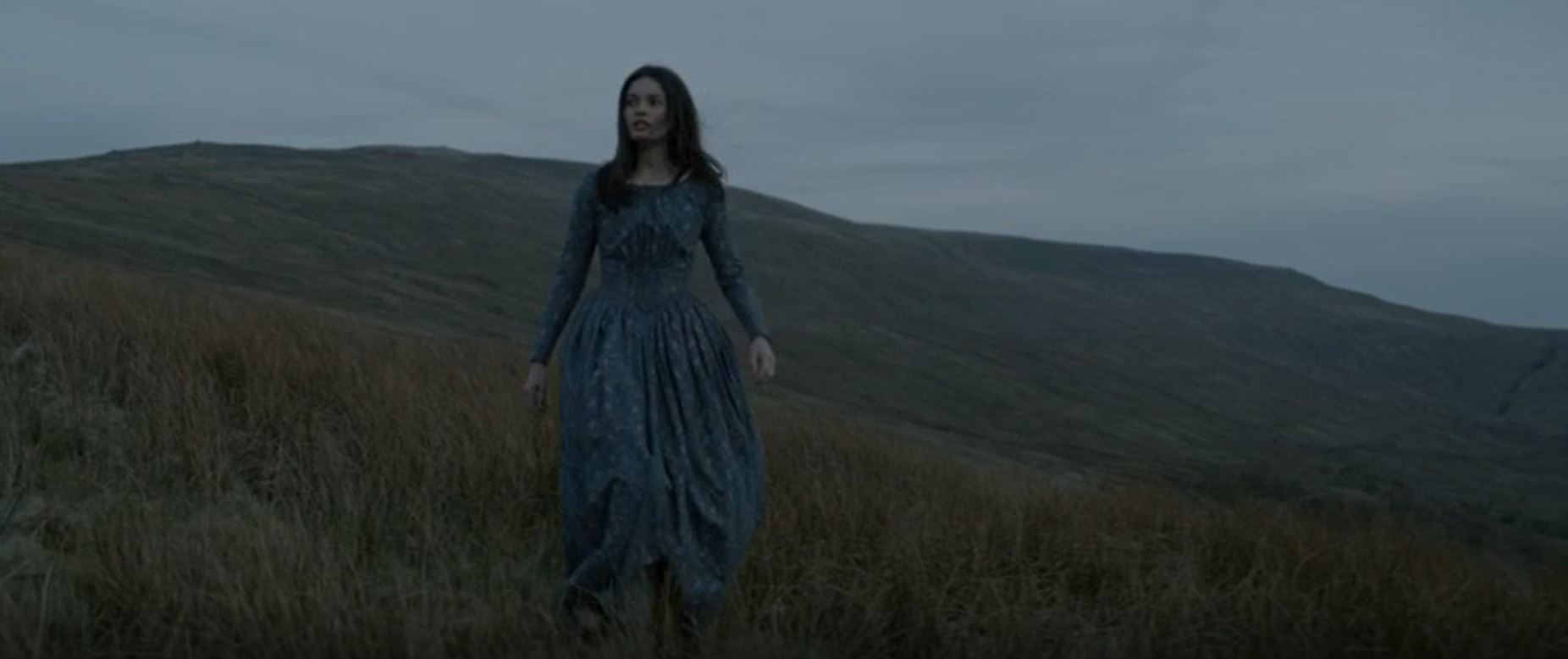Emily is not a lesson in historical accuracy but is still a strong period drama!
Let’s get one important thing out of the way first: we don’t go to films for historical accuracy, right? We know if there are conflicts between cinematic impact and real-life truth, truth doesn’t always win. If you keep that in mind as you watch the new literary biopic Emily, then you will feel its full effect. This movie revises history but crafts an unforgettable portrait of its central figure. It’s just a beautiful period drama in general, too.
In case the title didn’t give it away, Emily is about Emily Bronte (Emma Mackey), the second of the three Bronte sisters. Charlotte, Emily, and Anne’s novels have stood as centerpieces of English literature since their publication in the 1800s, though they were first released under male pen names. The only novel Emily left behind before her untimely death was Wuthering Heights. Many aspects of that tragic love story led people to question how the daughter of a proper country parson could’ve written it, and some even tried to attribute it to their older brother Branwell (Fionn Whitehead). After Emily’s death, various sources, such as Charlotte’s writings, created a picture of a fascinating, mysterious woman.
This film strives to create that personality on screen. And it succeeds. Emily reveals a person who is not often easy to understand but has a worthwhile complexity. Underneath the aesthetic production values, the film has a feminist heart that beats to its own drum.

“Any man may speak, what I want to know is, can he do?”
The opening shot of this film is a medium close-up of Emily as she almost faints during the illness that would take her life. After she is settled on the sofa and the doctor sent for, she is alone with Charlotte (Alexandra Dowling), who asks her how she wrote Wuthering Heights. The film itself wants to provide an answer to that question. It does so by combining reasonable extrapolations about Emily’s personality with significant speculation.
The events dramatized here begin when flirtatious young curate William Weightman (Oliver Jackson-Cohen) arrives in Haworth. Charlotte and a friend of hers who is visiting seem to be interested in his attention but Emily’s behavior presents a problem. She can be reckless of propriety and anti-social. She goes to the school where Charlotte teaches to try to teach but it doesn’t work. Emily is writing her remarkable poetry at this time but keeps it private. Charlotte works to please their father, but Branwell’s well-known vices– drinking, affairs, opium– overshadow everything else.
Something the film does well is representing these sibling relationships in an authentic way. Writer-director Frances O’Connor, who is also a successful actress, understands the swings that can happen between stubborn loyalty and casual cruelty among family. Emily and Charlotte are close but can’t escape a vein of competition. Emily and Branwell’s bond is solidly developed as well.

“There is one true happiness in this life: to love and be loved in return.”
By far, the biggest creative liberty taken with the story here is the romance between Emily and Weightman. I have never read any evidence for this in real life but it is used cleverly. The chemistry between Mackey and Jackson-Cohen is strong, and their bodice-ripping scenes work. They feel like a natural progression from their early, prickly interactions. As he tutors her in French, they challenge each other’s ideas. But the physical bliss can’t last. A competitive moment between Emily and Charlotte shows Charlotte’s obvious disapproval, causing Weightman such guilt that he ends things.
From this point on, the events share the tragic tone that Wuthering Heights is known for. Emily leaves to try teaching again and Weightman contracts cholera and dies. O’Connor shifts the timeline noticeably from real life after this by stretching the time between Branwell’s death and Emily’s and placing the writing of Wuthering Heights in between. Then, Charlotte sits down to write what we can easily assume to be Jane Eyre after Emily’s death. However inaccurate this may be, it does create a tangible sequence of emotional progress for Emily as a character. And that’s what a film like this needs.
Mackey brings that progress to life in an excellent performance. Emily is fierce and fragile simultaneously. The supporting actors, especially Whitehead, are superb as well. I’d also like to single out the score by Abel Korzeniowski, as it was particularly outstanding. The atmosphere in which this story can work so well depends on these things, and this film has them in place. Setting aside the lack of historical accuracy, the story is strong because it positions the central character as the anchor for all of the emotional momentum. Emily is not a history lesson but it is a good film, and it looks beautiful too.
Emily is now playing only in theaters.

